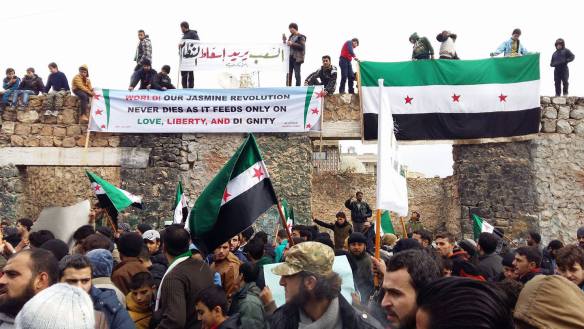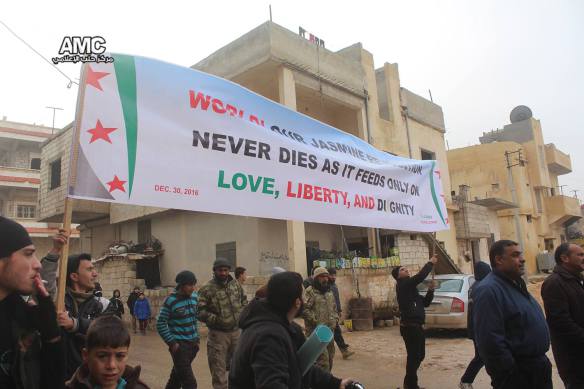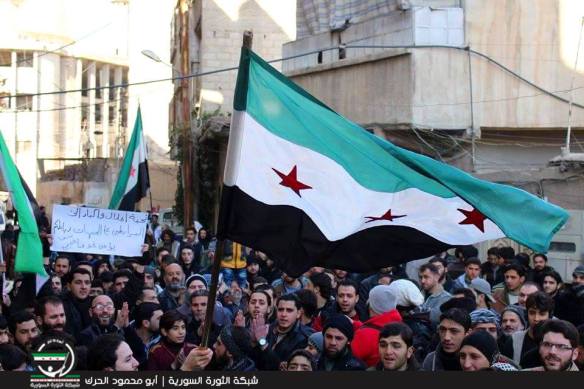Demonstrations in al-Atareb, Aleppo countryside, against attempts by jihadist group of Jabhat Fateh al-Sham to take over the oven of the town – مظاهرة في الأتارب، ريف حلب، ضد محاولات من فتح الشام للسيطرة على فرن البلدة
خروج مظاهرة في المدينة استمراراً للمظاهرات الاسبوعية المطالبة باسقاط نظام الاسد الارهابي ترفض طلب هيئة تحرير الشام استلام ادارة الفرن الذي هو ملك للمدنيين والتأكيد على تولي المجلس المحلي كامل السلطات المحلية فيها
Demonstrations in al-Atareb, Aleppo countryside, against attempts by jihadist group of Jabhat Fateh al-Sham to take over the oven of the town . Very Interesting placards such as “the oven of al-Atareb is the property of the people” or “our institutions are property of the people and not spoils of someone”, “Al-Atareb is a free city under a civil administration ruled by a local council elected by the people”…
Politics of emancipations come from the struggle from below of the popular classes.
For more information on this issue: http://en.aleppo24.com/the-jabhat-fateh-al-sham-are-attempting-to-capture-the-bread-oven-of-atarib-city-as-a-means-to-control-the-possession-of-bread-in-the-region
« Hezbollah: l’économie politique du parti de Dieu » par Joe Daher
En dépassant les approches les plus courantes sur le parti libanais qui se concentrent sur le discours religieux ou des questions militaires, Joseph Daher tente d’analyser le parti dans sa globalité dans un contexte politique et socio-économique spécifique : un système politique libanais dominé par le confessionnalisme et le néo-libéralisme économique.
Conférence “Avec la révolution syrienne”, Lyon 14 Janvier 2017
What Happened in Aleppo?
 Democratic forces have always been the main target of the Assad regime.
Democratic forces have always been the main target of the Assad regime.
The liberated neighborhoods of eastern Aleppo, under the control of neither the Assad regime nor the jihadist forces, fell in mid-December. Residents endured a continuous stream of air raids while pro-regime forces — hundreds of elite soldiers from the Republican Guard and the Syrian Fourth Division, with thousands of foreign fighters led by Iran and Hezbollah — advanced on the ground.
Eastern Aleppo has been under siege since July 2016, and the civilian population lacked food, water, medicine, and other necessities. Before the takeover, about fifty thousand people had fled, mostly to regime-controlled areas. Several thousand, however, went to the Sheikh Maqsoud neighborhood, which is under Kurdish control. Some sources report that the regime has ordered the Kurdish armed forces, the People’s Protection Units (YPG), to leave their stronghold before the end of the year.
Meanwhile, a few days after the official announcement of the takeover of Aleppo, on December 29, Russian military officials hosted a meeting in their air base at Hmeimim in western Syria with various representatives of Kurdish movements, including both the Democratic Society Movement (Tev-Dem) — implicitly representing the Kurdish Democratic Union Party (PYD) — and the Kurdish National Council (KNC), supported by the Kurdistan Democratic Party (KDP), to mediate future relations between them and the Assad regime. Continue reading
Syria: Grassroots Democracy, Future Prospects (Part II)
 This is the second of a two-part interview. You can read the first part here.
This is the second of a two-part interview. You can read the first part here.
What do you make of events in the Kurdish areas of Syria, particularly what David Graeber has called “the remarkable democratic experiment” in Rojava? What is the relationship between Kurdish groups and revolutionaries in the rest of Syria?
The self-governance of Rojava in Northern Syria by the PYD is a direct result of the mass movement by the people of Syria (Arabs, Kurds, and Assyrians together) against the Assad regime. The popular uprising pushed the regime to conclude a deal with the PYD in July 2012, in which it withdrew from several Kurdish-majority regions in the North to redeploy its armed forces to repress the uprising elsewhere, while maintaining a small presence in some areas such as Qamichli and Hassaka.
Institutions in these areas are dominated by PYD-affiliated organizations, with an assortment of Kurdish, Syriac, and Assyrian personalities who had little to lose from entering the agreement. For a far majority of Kurdish political parties and activists, Rojava is only a new form of authoritarianism rather than democratic confederalism in action. As evidence of this, many of them point to the exclusion of opposition parties and activists from youth groups within Rojava. Continue reading
Revolution and Counter-Revolution in Syria (Part I)
 This is the first of a two-part interview. You can read the second part here.
This is the first of a two-part interview. You can read the second part here.
Coverage of the conflict in Syria frequently refers to the opposition being dominated by Islamist groups. What was the initial composition of the opposition against the Assad regime and how has it evolved?
Well, it is important to understand that the Syrian revolution is part and parcel of a broader movement that has fundamentally shaken the Middle East and North Africa regions. It is clearly situated in the context of other uprisings which resulted from the confluence and mutual reinforcement of different sites of dissatisfaction, struggle, and popular mobilization. Most observers have analyzed the Syrian uprising solely in geopolitical terms, ignoring the popular political and socio-economic dynamics. However, Syrians have been fighting for freedom and dignity against authoritarianism and fundamentalism, just like Egyptians, Tunisians and Bahrainis did in 2011. Continue reading







